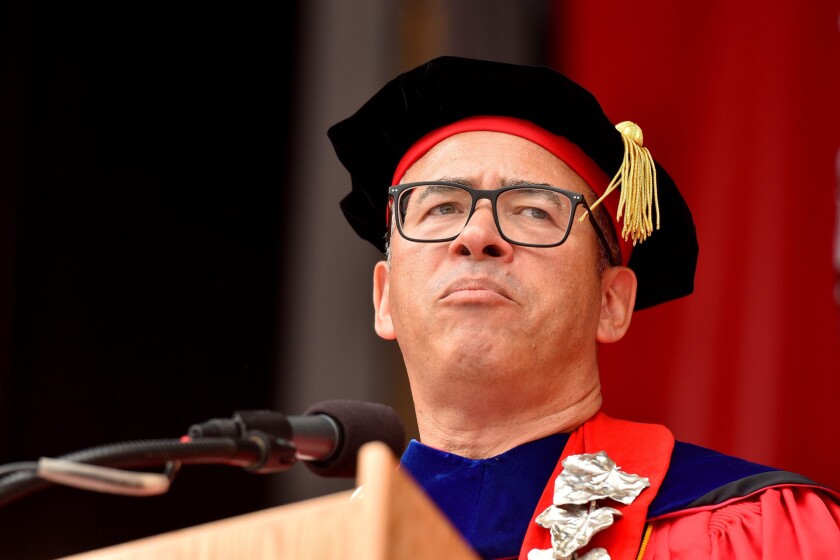The Rutgers University Senate on Friday voted no confidence in the system’s president, Jonathan Holloway, following months of tumult.
The resolution passed by a decisive margin, 89 to 47, after more than an hour of discussion in which senators voiced strong support for it. Although some spoke against the resolution, no one spoke in favor of Holloway, who has been president since 2020. (The Senate is composed mostly of faculty members but includes some staff members, administrators, students, and alumni.)
In a statement to The Chronicle, a university spokeswoman said Holloway had “strengthened Rutgers, from making the university a higher-education leader during the pandemic to raising our national and international reputation.”
The president has drawn scrutiny of late after months of controversy. A copy of the Senate resolution obtained by The Chronicle details grievances against Holloway’s leadership, including his threat to seek a court order to force thousands of striking instructors back to work after they walked out to demand increased pay, job security, and affordable housing. The Rutgers administration later dropped the threat at the request of Gov. Phil Murphy of New Jersey. (The two sides agreed on a new contract in May.)
“When we went on strike, after nearly a year of working without a contract, he threatened to throw us in jail,” said Audrey Truschke, an associate professor of history on the Newark campus, during the Senate meeting. “I have to go to work every single day knowing that my president, my boss’s boss’s boss, might well have put me behind bars for exercising my labor rights.”
The resolution also denounced Holloway for approving a 6-percent tuition rise, a 5-percent room-and-board increase, and a 7-percent jump in meal-plan prices. The university partly attributed the increases to the higher costs of salaries, wages, and employee benefits.
A Widening Rift
Holloway, a historian who previously served as provost at Northwestern University, has also come under fire for not renewing the contract of Nancy E. Cantor, the popular chancellor of the Newark campus. And he faced an outcry for approving the merger of two of Rutgers’s medical schools despite widespread objections.
In a discussion before Friday’s vote, senators voiced frustration not just with Holloway’s actions but with what they characterized as a lack of commitment to shared governance, alleging that the president had failed to take faculty, staff, and student input into consideration.
“President Holloway has had many chances to address the issue of shared governance, which is really what this is about on the whole, and has not done so,” said Heather Pierce, a lecturer in political science on the New Brunswick campus, the flagship.
The Senate, which has representatives from all three Rutgers campuses, does not have the authority to remove a president from office; the vote of no confidence is symbolic.
Several senators said they feared a vote of no confidence could widen the rift between instructors and the administration.
“I don’t think it will help us to rebuild bridges, that [it] will help the Senate to get to where it is at its best, which is being able to provide advice and contribute to a dialogue with the administration. I think this builds bigger walls between the Senate and the university,” said Kevin Schroth, an associate professor in the Rutgers School of Public Health.
Before the meeting, members of the Senate received a letter from the Board of Governors. In the letter, which was obtained by The Chronicle, the chair of the board, William Best, celebrated Holloway’s leadership, writing that the board had “steadfast” support for the president.
Paul Boxer, a faculty senator from the arts and sciences school at Newark, introduced the resolution. Now, he said, the ball’s in Holloway’s court.
“He can respond to us. He can re-engage with us. He can open a dialogue,” Boxer said. “Or he can continue to do what he’s been doing and ignore the things that we are saying and continue to treat this entire community with disdain. Or he can leave — that’s his prerogative.”
